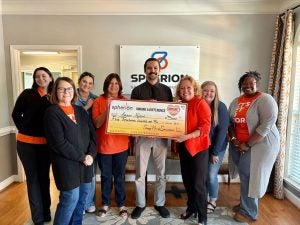A quiet explosion of economic development has been underway in South Richmond County, $3.2 billion in all. A long-time plant has expanded, another major new manufacturing plant is under construction and two other companies are expected to start construction in the months ahead. All are in the Augusta Corporate Park on Mike Padgett Highway.
But, two things are lacking outside of the I-520 perimeter, a pool of trained workers and sufficient new housing units to attract employees at the plants to move into Richmond County.
Cal Wray, President of the Augusta Economic Development Authority (AEDA), recently took Augusta Business Daily and District Six Commissioner Brandon Garrett, on a tour of developments in the park and other parts of South Augusta. All the development is happening in Garrett’s district.
The Augusta Starbucks plant has nearly doubled in size since it opened in 2012. Just down the road, the Aurubis plant, which will recycle copper, precious metals, and non-ferrous materials, is taking shape. Those will be joined by Denkai America, which does copper foil for the automotive and aerospace industries. The latest plant announced for the park is PureCycle that recycles #5 plastic waste into a renewable resource.

Combined, those four plants will add close to a thousand jobs over the next five years.
One problem has a relatively simple solution, use the time it will take to have all the plants up and operational to get people trained in the necessary skills.
“One of the things that has really been impressive is how Augusta Tech has really stepped up to be willing to partner to help some of that training for the locals,” Garrett said. “So, I think that as we’re moving forward and looking towards the future, it’s going to provide our kids and grandkids opportunities that we were never presented with.”
Wray agreed training is vital. Many of the jobs that will be created start at $15 an hour and higher. Those jobs require a level of education and specific skill sets.
![]()
“Augusta Tech is a great partner, the universities and colleges just over the line in Aiken County have been partners,” he said. “Those are the vital institutions providing those skill sets in the worker, so they can demand these wages.”
Will Williams, President and CEO of Western South Carolina Economic Development Partnership, said training workers crosses all boundaries.
“While selfishly, we’d like for all these young people to stay here in Aiken County to work, we know there are opportunities over the Georgia side of the river. That’s why Cal and I collaborate, because we share the labor force,” he said.
Paying for post-high school education and training can cost less for people in Richmond, Columbia, Aiken, and Edgefield counties. Augusta Tech, Augusta University, Aiken Tech and USC-Aiken have a reciprocal agreement. That means students pay in-state tuition at those four institutions, even if they live on opposite sides of the Savannah River.
While training a skilled workforce can be relatively simple, the second need is more complex.
South Augusta needs homes.
“Got to have rooftops,” Garrett said. “You know, that’s one of the things that I’ve been pushing, especially in my first four years in office, is helping developers come to South Augusta, South Richmond County, because we want these jobs. But more importantly, we want these people to live in Richmond County.”
“We do need more housing. There’s obviously been more housing starts in Columbia and Aiken than Augusta, but we’re seeing housing starts again in Augusta,” Wray added. “We need everyone working together from the chamber to the CVB to our county commission, working together to help continue creating an environment where people can grow, expand and live.”
There are some home construction projects announced or underway. One, Premier Estates, will be a gated community on 60 acres on Brown Road at Old Waynesboro Road. Also on Brown Road, near Mike Padgett Highway, just across from the corporate park, two more housing developments are being laid out.

Currently, large plants in South Richmond County, including E-Z-Go/Textron, Solvay Polymers, and FedEx, are drawing employees from Aiken, Columbia, Burke, and other outlying counties.
The goal is to provide new housing stock to lure employees at the existing companies and those who will be hired for future development to live in Richmond County.
Increasing the county population can mean two things. First, more homes and residents mean a larger tax base. A larger tax base means more cash in the general fund and that provides money for projects like recreation, transportation, and infrastructure.
The second thing is, to paraphrase the old saying, if you build houses, support businesses will follow.
“When I ran for office, the things that I kept hearing over and over again from my constituents were, ‘We want grocery stores, we want retail, we want nice restaurants, we want options’ and none of those things happen without having the rooftops that are needed to support that all of these companies,” Garrett explained. “You know, Kroger, Outback, any of these big chains that people are wanting to come to South Augusta will do a market study. How many people live within a certain amount of business, and what are their incomes and so, those are the types of things that we need to make sure are in place. That way it attracts them.”

Wray and Garrett both agree that gone must be the days when people thought of “two Augustas,” the one north of Gordon Highway and the one south of Gordon Highway.
Garrett said, “One of the biggest misconceptions is the South Richmond County stigma that’s out there and we really have to overcome that to encourage this development.”
“And I’ll take that one step further. It’s not just Richmond County. It’s also all the counties around us because so many people travel into Augusta every day to work,” said Wray. “They also come here for health care. They come here for their retail. So, we need all of that to grow, not just for Augusta, but all the surrounding region.”
Wray added there is one thing he would encourage people to do.
“Take a Saturday afternoon and drive out and look to see what our employers are looking at. What’s here? Look to see what we have and explore,” he said.






